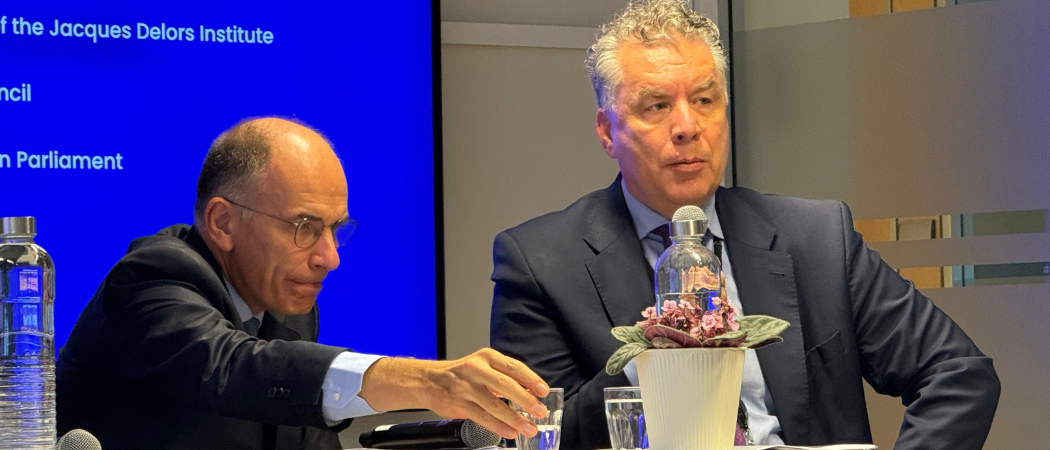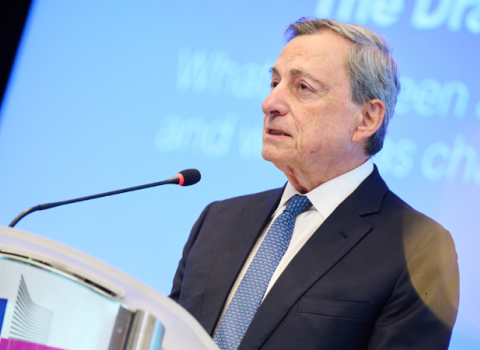As speculation grows, Christian Ehler MEP claims key decisions on FP10 will be made in the coming weeks

German MEP Christian Ehler (right) and former Italian prime minister Enrico Letta (left) at the Research Matters' event held in Brussels on October 2, 2024. Photo credits: Eleonora Francica / Science|Business
With circulating rumours about the future of the next Framework Programme raising concerns in the European research and innovation community, German MEP Christian Ehler says its structure will be decided in the coming weeks.
After Commission president Ursula von der Leyen announced the portfolios of her new college of Commissioners, rumours started spreading in Brussels about whether FP10 will keep its current three pillar structure as a standalone programme in the next multiannual budget, or if parts of it will be subsumed into the proposed Competitiveness Fund.
Speaking at an event on Wednesday organised by Research Matters, which campaigns for more EU science funding, Ehler said the Commission’s budget directorate general wants the competitiveness fund to have innovation instruments. However, in response to a question by Science|Business, he described the idea of a super fund as a French “dream”.
Ehler warned that the EU needs to make a careful assessment of whether it makes sense to integrate research into a competitiveness fund. He also noted that MEPs will have a say in the process and “the majority in the Parliament is for a ringfenced programme”.
“There is an intensive discussion right now, [which will be] mostly decided in the next weeks, on whether we have a standalone programme or [not],” said Ehler.
“You have to be very careful whether it makes sense to some extent to integrate research into a competitiveness context, or is it just the old French administrative dream to get this super budget where all is squeezed in,” he said.
Maria Leptin, president of the European Research Council (ERC) is also in the dark. “I have no crystal ball,” she said. “We're all a little bit concerned for all pillars. […] I wish I knew the answer.”
There are mixed messages from the top. Speaking in Geneva on Tuesday at the 70th anniversary of CERN, von der Leyen said the EU should increase research spending in the next EU budget.
“Horizon Europe is the largest research investment programme in the world. Its crown jewel is the ERC. That financed research that resulted in 14 Nobel Prizes. We must invest in this. This is why I want to increase research spending in our next budget,” von der Leyen said.
There was no mention of the structure of the research programme.
Fifth freedom
But a bigger budget or a new structure for FP10 is not silver bullet for strengthening Europe’s research sector. Legislation will be needed too.
Last month, von der Leyen’s proposed a European Research Area act in her mission letter to research commissioner designate Ekaterina Zaharieva. This initiative would underpin a single market for research, innovation, knowledge and education.
Former Italian prime minister Enrico Letta recently wrote a high-profile report that called for a revamped single market to include this fifth freedom.
Speaking at the Research Matters event, Letta said the European Research Area act proposed by von der Leyen could be the vehicle for delivering the fifth freedom. “It’s the revolution that we need,” he said, noting the real obstacles to a unified EU research market are at national level.
Letta told Science|Business the act would catalyse development of the fifth freedom. “It’s a way to bring greater attention to an issue where we are clearly lagging, and where a push from the top is absolutely essential. The method for doing so can be determined later, but this is certainly the most effective way to drive that necessary momentum,” he said.
Letta also stressed the need for stronger links between research and financial markets. “Without the integration of financial markets, we lack scale, and we lack investments at large scale and at European level,” Letta said.
One of the other reasons the EU is lagging behind US and China is that the integration of the EU single market is incomplete. This because financial services, telecoms and energy, which are main planks of a single market, are controlled by member states.
While it’s true that the EU needs more public investment, it’s also the case that the big difference from the US is a lack of private investment, Letta said.
The leading organisations behind the Research Matters campaign are calling for ringfencing and a doubling of budget for FP10 to €200 billion. Another goal is to increase national funding for R&D, to over 3% of GDP.





 A unique international forum for public research organisations and companies to connect their external engagement with strategic interests around their R&D system.
A unique international forum for public research organisations and companies to connect their external engagement with strategic interests around their R&D system.